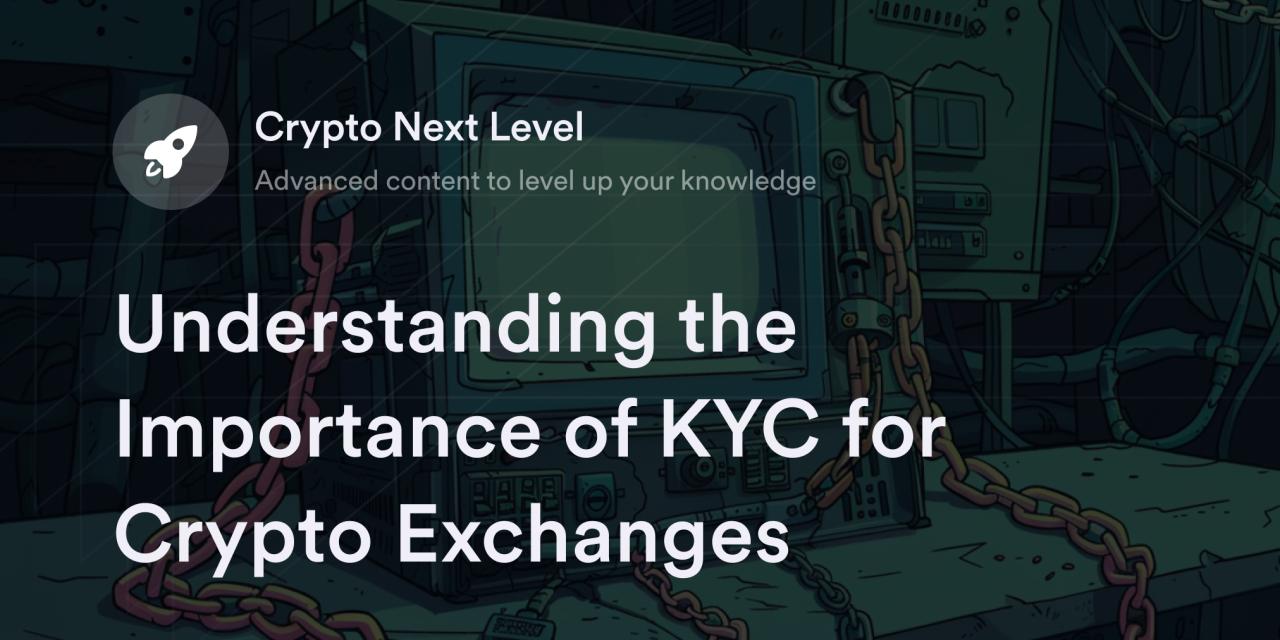


Cryptocurrency’s privacy––powerful yet controversial.
While stealing virtual currency is not as easy as it seems, national and international regulators frequently express concerns over money launderers using crypto’s anonymity to hide nefarious operations.
As digital assets garner mainstream attention, more countries want crypto platforms to use a standard set of data-collecting procedures to verify customers, monitor transactions, and scan for illicit activities. For many cryptocurrency exchanges, the standard way to comply with these national regulations is through know-your-customer (KYC).
So what is KYC in crypto, how does it work, and why do so many crypto exchanges use it? Also, are there legitimate ways to avoid KYC requirements when trading digital assets?
What Does KYC Mean in Crypto?
KYC refers to a set of ID requirements some crypto companies use to verify users’ identities. Centralized crypto exchanges (CEXs) like Coinbase often use KYC to comply with financial services and crypto-related laws to offer products and services in a given jurisdiction. Using KYC procedures helps CEXs meet guidelines for anti-money laundering (AML) and counter-terrorism financing (CFT) by linking the financial activity of every user to unique individuals. KYC policies also help CEXs pre-screen traders, which they deem “high-risk” for illicit activities, and prevent them from accessing digital assets.
How Does the KYC Procedure Work on Crypto Exchanges?
Typically, every CEX uses slightly different KYC process steps to onboard users, but most ask new users for the following data to verify identity:
Full legal name
Date of birth
Nationality
Current home address
Email address
Phone number
After mentioning these details, customers often take pictures of their government-issued IDs (e.g., a driver’s license or a passport) and upload it on the CEX’s website. Then, the CEX may then ask to access the camera on a customer’s PC or mobile device to take a few selfies. CEXs use these pictures to double-check that a person’s facial biometrics match the photo on the government-issued ID.
Typically, after a CEX analyzes all this information, it decides whether to allow the applicant on their platform. While every exchange has different screening methods, many tell customers whether they pass KYC requirements within a few hours or one business day.
Pros and Cons of KYC in Crypto
Sometimes, people who prioritize online privacy aren’t fans of KYC policies, but KYC brings some benefits to the cryptocurrency industry. On the contrary, for some regulators and consumers, KYC measures are a significant step toward a more mainstream digital economy.
KYC Pros
Brings legitimacy to the crypto industry: Some customers feel KYC’s transparency improves crypto trading’s safety profile and legitimacy. Countries, companies, and individual traders––even if they have to give up personal information––often feel more comfortable using a highly regulated CEX.
Helps authorities spot financial crimes: Once verified, it’s easier for CEXs to monitor abnormal trading activity or spot incoming transfers from crypto wallets associated with illegal activities. If authorities suspect an account is involved in money laundering, drug trafficking, or other illicit operations, they can freeze the trading account on a CEX.
Might offer insurance protections: No federal insurance policies exist for digital assets, but CEXs might offer customers financial assistance if hackers steal funds. For example, Coinbase reimbursed 6,000 customers after hackers broke into their accounts in 2021 and stole funds. Although not every CEX offers coverages for crypto assets, some companies may offer these safety services to clients.
KYC Cons
Raises privacy concerns: KYC makes it difficult for customers to trade and make crypto transactions anonymously. Even if traders transfer crypto off an exchange to a self-custodial wallet, a “digital trail” makes it easy for governments, CEX leaders, and even individuals to link wallet addresses with unique individuals.
Increases potential for a data breach: If hackers break into a CEX’s database, they can access sensitive personal data for every customer. There are few cases in crypto history when hackers stole email addresses and phone numbers from CEX customers and launched phishing attacks.
Limits access to cryptocurrency: Since CEXs only accept traders who comply with their identity verification processes, it makes it impossible for everyone to participate in the crypto economy. People who don’t have the “proper” paperwork can’t use crypto-related financial services.
How to Buy Crypto Without KYC
Finding a non-KYC exchange is challenging, but many decentralized exchanges (DEXs) have zero KYC requirements. Unlike CEXs, DEXs offer a peer-to-peer (P2P) crypto trading experience thanks to blockchain technology’s decentralization. Instead of providing crypto trading services on a centrally controlled platform, crypto traders on DEXs use self-custodial crypto wallets to swap digital assets without a central intermediary. For context, self-custodial means the wallet’s user knows an essential passcode called the private key, which gives them ownership over the cryptocurrencies in their account. In contrast, CEXs give customers custodial crypto wallets when they sign up for an account, meaning the CEX holds the private key on a customer’s behalf. So once a CEX user transfers crypto from an exchange into their self-custodial wallet, they can control their digital assets.
To use a non-KYC DEX , traders need a compatible self-custodial wallet and cryptocurrency. Most DEXs have a “Connect Wallet” button on their homepage. After clicking this button and linking a supported crypto wallet, users can trade cryptocurrencies on a DEX. There’s no need to provide KYC documents to use DEXs, and traders receive the cryptocurrency they want directly in their linked crypto wallet.
Do Crypto Wallets Have a KYC Procedure?
Crypto wallets that provide users a private key don’t collect KYC data. Typically, when people set up a decentralized non-custodial wallet, they see a list of 12–24 words known as a seed phrase, which represents their account’s unique private key. Since people with private keys can control the cryptocurrency in their wallets, they should keep this passcode a secret. Crypto traders can also use their seed phrase as a backup if they lose access to their wallets.
Although most self-custodial crypto wallets don’t require KYC data, users must submit KYC details to access custodial crypto wallets on CEXs. CEX wallets hold crypto assets like self-custodial wallets, but users who use these custodial services don’t know the private key for their cryptocurrency––thus the CEX safeguards crypto on each user’s behalf. While the centralization of CEX wallets may provide special insurance protections, they also force customers to rely on third parties to watch over their cryptocurrencies. This also means that traders using CEXs are inherently taking on third-party risk.
Enjoy Crypto Perpetuals Trading on dYdX
dYdX is the leading DEX for crypto derivatives trading. All eligible dYdX traders need to access deep liquidity for dozens of crypto perpetual contracts is a compatible crypto wallet. After linking a wallet like MetaMask to dYdX’s exchange, eligible users can long or short their favorite digital assets, including Bitcoin, Ethereum, and Cardano.
For more information about the latest dYdX product updates or how to use the exchange, head to dYdX’s blog. If you want to learn about crypto topics, such as crypto lending, staking, and trading, check out our Academy.
Eligible traders can start trading on dYdX today!
Disclaimer
The content of this article (the “Article”) is provided for general informational purposes only. Reference to any specific strategy, technique, product, service, or entity does not constitute an endorsement or recommendation by dYdX Trading Inc., or any affiliate, agent, or representative thereof (“dYdX”). Use of strategies, techniques, products or services referenced in this Article may involve material risks, including the risk of financial losses arising from the volatility, operational loss, or nonconsensual liquidation of digital assets. The content of this Article does not constitute, and should not be considered, construed, or relied upon as, financial advice, legal advice, tax advice, investment advice, or advice of any other nature; and the content of this Article is not an offer, solicitation or call to action to make any investment, or purchase any crypto asset, of any kind. dYdX makes no representation, assurance or guarantee as to the accuracy, completeness, timeliness, suitability, or validity of any information in this Article or any third-party website that may be linked to it. You are solely responsible for conducting independent research, performing due diligence, and/or seeking advice from a professional advisor prior to taking any financial, tax, legal, or investment action.
You may only use the dYdX Services in compliance with the dYdX Terms of Use available here, including the geographic restrictions therein.
Any applicable sponsorship in connection with this Article will be disclosed, and any reference to a sponsor in this Article is for disclosure purposes, or informational in nature, and in any event is not a call to action to make an investment, acquire a service or product, or purchase crypto assets. This Article does not offer the purchase or sale of any financial instruments or related services.
By accessing this Article and taking any action in connection with the information contained in this Article, you agree that dYdX is not responsible, directly or indirectly, for any errors, omissions, or delays related to this Article, or any damage, injury, or loss incurred in connection with use of or reliance on the content of this Article, including any specific strategy, technique, product, service, or entity that may be referenced in the Article.







